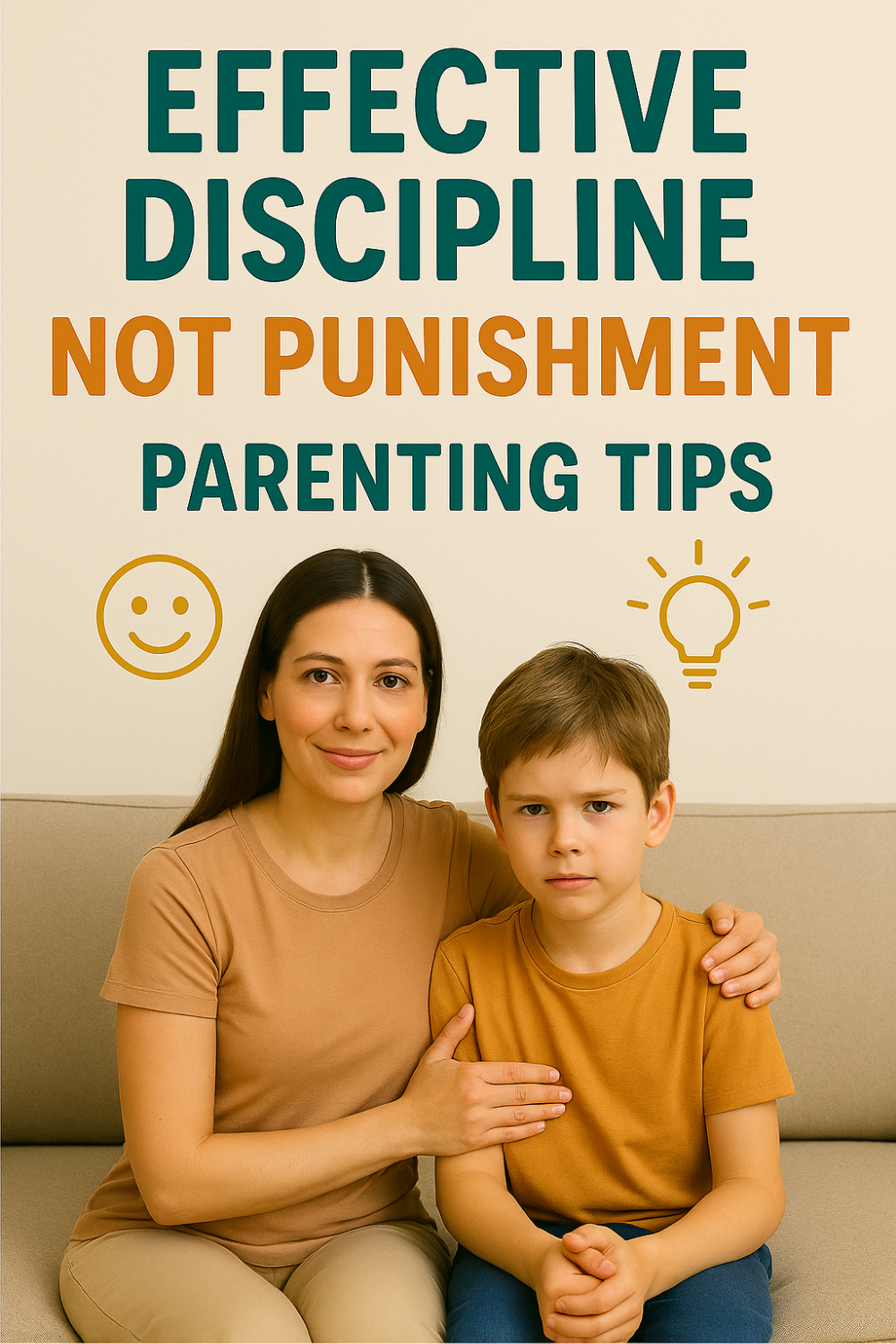Many parents confuse discipline with punishment, often using them interchangeably without realizing the important differences. Understanding how each approach impacts your child’s behavior and emotional growth is essential for effective parenting. Ready to parent with clarity and confidence? Discover exactly how discipline differs from punishment, and learn healthier, more effective strategies for guiding your child’s behavior today.

- What Discipline Really Means
- The True Meaning of Punishment
- Emotional Effects: Discipline vs. Punishment
- How Discipline Shapes Behavior Positively
- Negative Consequences of Punishment
- Practical Discipline Techniques That Work
- Transitioning from Punishment to Discipline
What Discipline Really Means
Discipline is about teaching, guiding, and helping your child develop self-control and responsible behavior. It’s a positive, proactive approach aimed at long-term learning and emotional growth, not merely controlling immediate behavior.
Discipline involves setting clear expectations, modeling appropriate behaviors, and using logical, meaningful consequences that help children understand the reasons behind rules. Effective discipline is empathetic, supportive, and patient, fostering emotional intelligence, respect, and independence over time.
In short, discipline empowers children to make better choices independently, teaching valuable life skills such as responsibility, problem-solving, and self-regulation.
The True Meaning of Punishment
Punishment, unlike discipline, aims primarily at stopping unwanted behavior immediately through negative consequences. Punishments often involve shame, fear, or pain—such as yelling, spanking, isolation, or removal of privileges.
While punishment may temporarily stop misbehavior, it rarely teaches children why their behavior was inappropriate or how to make better choices in the future. Instead, punishment often leaves children confused, resentful, and focused more on avoiding consequences rather than understanding the actual behavior or the impact of their actions.
In essence, punishment typically prioritizes short-term compliance rather than fostering genuine understanding or long-term behavioral change.
Emotional Effects: Discipline vs. Punishment
The emotional impact of discipline versus punishment is significantly different, influencing your child’s long-term emotional well-being and behavior.
Emotional Effects of Discipline:
- Builds Trust and Respect: Discipline creates a safe, supportive environment, fostering trust and positive relationships.
- Encourages Empathy: Teaches children to consider how their actions affect others, building empathy and emotional intelligence.
- Boosts Self-Esteem: Discipline strengthens confidence, independence, and problem-solving skills, promoting a healthy self-image.
Emotional Effects of Punishment:
- Promotes Fear and Anxiety: Children often feel anxious or fearful, worrying about consequences rather than learning healthy behavior.
- Creates Shame and Guilt: Punishment typically leaves children feeling embarrassed, ashamed, or insecure, negatively impacting self-worth.
- Damages Trust: Frequent punishment harms the parent-child relationship, creating distance and weakening emotional bonds significantly.
Clearly, discipline’s positive emotional impacts far outweigh the damaging effects of punishment.
How Discipline Shapes Behavior Positively
Effective discipline transforms children’s behavior positively by teaching essential skills, responsibility, and emotional awareness.
- Clear Expectations: Discipline clearly communicates rules, routines, and expectations, helping children understand exactly what’s required.
- Logical Consequences: Logical consequences directly relate to behaviors, teaching accountability and responsibility naturally.
- Positive Reinforcement: Acknowledging and praising appropriate behaviors consistently motivates children to repeat positive actions willingly.
- Problem-Solving Skills: Discipline helps children learn to resolve conflicts constructively, promoting self-control and decision-making skills.
Using discipline consistently fosters your child’s long-term positive behavior, emotional maturity, and overall success.
Negative Consequences of Punishment
Punishment’s short-term effectiveness often masks long-term negative consequences for children’s emotional health and behavior development.
- Increased Aggression: Punished children frequently mimic aggressive behaviors, increasing defiance, anger, and conflict.
- Poor Self-Control: Punishment rarely teaches internal self-control, creating dependency on external control through fear.
- Reduced Emotional Intelligence: Punishment inhibits empathy and emotional development, limiting children’s understanding of their emotions and others’ feelings.
- Relationship Strain: Regular punishment damages parent-child relationships significantly, undermining trust, respect, and open communication.
Avoiding punishment prevents these negative outcomes, enabling healthier emotional development and more positive behavior patterns.
Practical Discipline Techniques That Work
Implement these effective, practical discipline strategies to promote positive behavior and healthy emotional growth:
1. Positive Reinforcement
- Consistently praise appropriate behavior clearly, immediately reinforcing positive choices and boosting self-esteem.
2. Logical Consequences
- Choose consequences directly related to behaviors (e.g., cleaning spilled messes) to teach responsibility effectively.
3. Clear Expectations
- Clearly communicate expectations and rules consistently, making desired behaviors understandable and achievable.
4. Redirecting Behavior
- Offer alternative activities or choices proactively, gently guiding children away from inappropriate behaviors.
5. Problem-Solving Together
- Collaboratively discuss behavioral challenges, helping children develop problem-solving skills and internal motivation.
Applying these practical discipline techniques regularly builds healthy behavior patterns and emotional maturity in your child effectively.
Transitioning from Punishment to Discipline
Shifting from punishment-based parenting to positive discipline strategies requires patience, consistency, and understanding. Follow these simple steps to make a smooth transition:
Step 1: Reflect Honestly
Identify your current methods and recognize any punitive behaviors or habits.
Step 2: Educate Yourself
Understand clearly how discipline differs from punishment and learn positive strategies thoroughly.
Step 3: Clearly Communicate Changes
Discuss openly with your child about changing your approach, setting clear expectations and emphasizing new positive methods.
Step 4: Practice Consistently
Commit to consistently using positive discipline strategies, even during challenging moments.
Step 5: Acknowledge Progress
Regularly acknowledge your child’s improvements and celebrate behavioral successes together.
Regularly following these steps ensures a positive, effective transition from punishment to nurturing discipline.
Frequently Asked Questions
Is punishment ever necessary in parenting?
Generally, punishment is less effective. Positive discipline methods consistently yield better behavioral and emotional outcomes.
Will my child misbehave more without punishment?
No, positive discipline reduces misbehavior effectively by teaching responsibility, self-control, and emotional intelligence.
What if my child doesn’t respond immediately to discipline?
Patience and consistency are key. Discipline’s effectiveness improves steadily with ongoing, clear implementation.
Can discipline methods work for older children?
Absolutely—discipline positively influences children and adolescents by teaching responsibility, self-regulation, and emotional maturity.
How can I stay calm and avoid punishment during stressful moments?
Pause, take deep breaths, briefly step away if needed, and remind yourself of discipline’s positive long-term outcomes consistently.